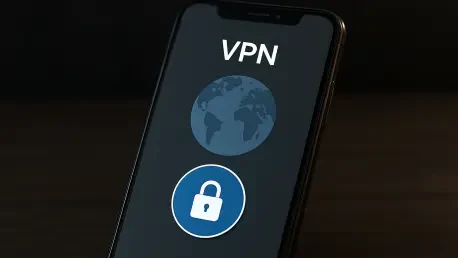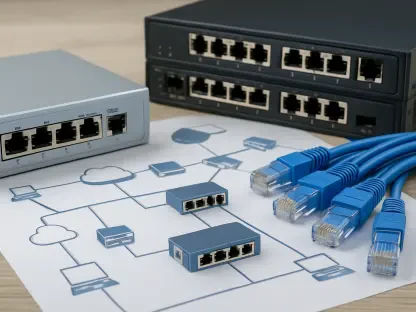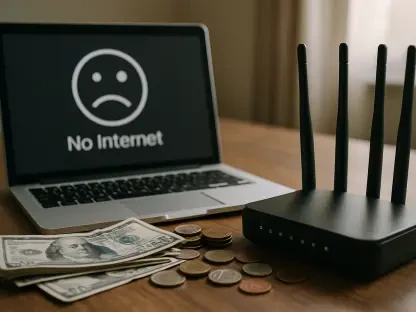A startling revelation has emerged from recent research, shedding light on the hidden dangers lurking within free Virtual Private Network (VPN) apps widely used on iOS and Android devices, with millions of users downloading these tools to shield their online activities from prying eyes. The assumption has long been that such apps provide a secure haven, but a comprehensive study by a leading security research team has turned this notion on its head, uncovering that nearly 800 of these free apps may be doing more harm than good. Far from protecting sensitive information, many are found to expose users to significant privacy breaches and security threats. This alarming discovery raises critical questions about the trustworthiness of free VPN solutions and the potential risks they pose to unsuspecting individuals who rely on them for safeguarding their digital lives. The implications of these findings are vast, urging a deeper examination of how these apps operate and what can be done to mitigate the dangers.
Unveiling the Security Flaws in Free VPNs
Outdated Software and Exploitable Vulnerabilities
The foundation of the security concerns surrounding free VPN apps lies in the outdated software many developers continue to use, creating a fertile ground for exploitation. A significant number of these applications incorporate components of the OpenSSL library that remain vulnerable to long-known flaws, such as the infamous Heartbleed bug. This critical weakness could potentially allow malicious actors to access highly sensitive data, including passwords and encryption keys, with relative ease. Such lapses in updating critical security elements reflect a troubling negligence in app development, leaving users exposed to risks that should have been addressed years ago. The persistence of these outdated systems in widely downloaded apps underscores a systemic issue within the free VPN market, where cost-cutting often appears to take precedence over robust security protocols, placing user trust in jeopardy.
Beyond the issue of outdated libraries, the study highlights additional vulnerabilities that compound the risks for users of free VPN apps on mobile platforms. Approximately 1% of the analyzed applications are susceptible to Man-in-the-Middle (MitM) attacks, a flaw that enables attackers to intercept and read user traffic as it travels across networks. This type of breach effectively strips away the protective layer that VPNs are supposed to provide, turning a tool meant for privacy into a conduit for surveillance. The presence of such exploitable weaknesses suggests a lack of rigorous testing and maintenance, further eroding confidence in these free services. For users, this means that even the most basic expectation of secure browsing could be undermined, exposing their online activities to potential threats without their knowledge or consent.
Permission Abuse and Invasive Practices
Another deeply concerning aspect of free VPN apps is the rampant abuse of permissions, where many request access far beyond what is necessary for their core functionality. On iOS, certain apps demand “always-on” location tracking, a feature irrelevant to securing internet traffic but highly invasive to user privacy. Similarly, Android apps often seek permissions to access system logs, which can reveal detailed user behavior akin to the capabilities of a keylogger. These excessive requests transform a supposed security tool into a potential surveillance mechanism, undermining the very purpose of a VPN. The audacity of such practices highlights a critical misalignment between user expectations and developer intentions, often prioritizing data collection over genuine protection.
Adding to the unease, some free VPN apps go as far as requesting access to microphones or performing screen captures, capabilities that have no justifiable connection to VPN services. This overreach creates an environment where users are unwittingly granting deep access to their devices, potentially allowing developers or third parties to monitor personal interactions or sensitive content. Such invasive practices are not only a breach of trust but also a stark reminder of the hidden costs associated with “free” applications. The lack of clear justification for these permissions raises red flags about the true motives behind many of these apps, urging users to scrutinize the fine print before installation. Without stricter oversight, these permission abuses continue to jeopardize the privacy that VPNs are meant to ensure.
Broader Implications and Protective Measures
Transparency Gaps and User Trust
Transparency, or the notable absence of it, stands as a significant barrier to user trust in free VPN apps across both iOS and Android ecosystems. A staggering 25% of iOS VPNs lack a valid privacy manifest on the App Store, a crucial document meant to inform users about how their data is handled. Moreover, over 6% of these apps request private entitlements, granting them extensive access to the operating system that third-party developers should not possess. This opacity prevents users from making informed decisions about the apps they download, often leaving them unaware of the extent to which their personal information might be collected or shared. Such practices not only violate user autonomy but also highlight a critical need for stricter regulations to enforce clear data handling disclosures.
The implications of these transparency gaps extend beyond individual users, affecting their confidence in digital tools as a whole. Without clear and accessible information about data practices, the relationship between app providers and users becomes one-sided, skewed heavily in favor of developers who may exploit this lack of visibility for profit. The absence of accountability mechanisms further exacerbates the issue, as users have little recourse to challenge or understand the extent of data usage. Addressing this challenge requires a concerted effort from platform providers like Apple and Google to mandate and verify privacy disclosures, ensuring that users are equipped with the knowledge needed to protect their digital privacy. Until such measures are in place, the trust deficit will likely persist.
Organizational Risks and Security Strategies
For organizations, particularly those embracing Bring-Your-Own-Device (BYOD) policies, the risks posed by insecure free VPN apps are amplified. Personal devices running these flawed applications can serve as weak links, potentially compromising sensitive business data when used for work purposes. The study emphasizes that relying on traditional perimeter-based security models, such as VPNs, may no longer suffice in an era where threats are increasingly sophisticated. Industry experts advocate for a shift toward content-level data protection and enhanced endpoint visibility to safeguard against breaches, even when device oversight is limited. This evolving threat landscape demands that companies rethink their security frameworks to prioritize robust, multi-layered defenses.
To mitigate these risks, businesses must adopt proactive strategies that extend beyond trusting employees’ personal app choices. Implementing application allowlisting, where only approved software can be used on work-related devices, offers a practical starting point. Additionally, fostering a culture of security awareness through regular training can empower employees to recognize and avoid risky apps. The consensus from security professionals is clear: the marketed benefits of free VPN providers often fall short of reality, necessitating a more critical approach to data protection. By focusing on comprehensive security measures that address both technical and human factors, organizations can better shield themselves from the vulnerabilities introduced by insecure mobile applications.
Moving Forward with Vigilance
Reflecting on the extensive research into free VPN apps for iOS and Android, it becomes evident that significant lapses in security, transparency, and accountability have placed countless users at risk. The findings expose how outdated software, invasive permissions, and opaque data practices have transformed tools meant for protection into sources of vulnerability. These revelations have sparked a necessary dialogue about the reliability of free digital solutions and the hidden costs they often carry. In response, both individual users and organizations have begun to reassess their dependence on such apps, recognizing the urgent need for more stringent standards in app development and oversight. The critical nature of these issues underscores a broader lesson about the importance of prioritizing security over convenience in an increasingly connected world. Moving forward, adopting a mindset of vigilance, advocating for clearer regulations, and investing in trusted, well-vetted security tools remain essential steps to ensure safer digital experiences for all.









